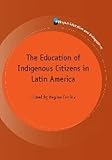TheEducation of Indigenous Citizens in Latin America / / ed. by Regina Cortina.
Material type: TextSeries: Bilingual Education & BilingualismPublisher: Bristol ; Blue Ridge Summit : : Multilingual Matters, [2014]Copyright date: ©2014Description: 1 online resource (224 p.)Content type:
TextSeries: Bilingual Education & BilingualismPublisher: Bristol ; Blue Ridge Summit : : Multilingual Matters, [2014]Copyright date: ©2014Description: 1 online resource (224 p.)Content type: - 9781783090952
- 9781783090969
- 371.829/9808 23
- LC3715 .E384 2014
- online - DeGruyter
| Item type | Current library | Call number | URL | Status | Notes | Barcode | |
|---|---|---|---|---|---|---|---|
 eBook
eBook
|
Biblioteca "Angelicum" Pont. Univ. S.Tommaso d'Aquino Nuvola online | online - DeGruyter (Browse shelf(Opens below)) | Online access | Not for loan (Accesso limitato) | Accesso per gli utenti autorizzati / Access for authorized users | (dgr)9781783090969 |
Frontmatter -- Contents -- Acknowledgments -- Contributors -- Introduction -- 1. Indigenous Intercultural Bilingual Education in Latin America: Widening Gaps between Policy and Practice -- 2. Partnerships to Promote the Education of Indigenous Citizens -- 3. Intercultural Bilingual Education in the Andes: Political Change, New Challenges and Future Directions -- 4. The Tension between Western and Indigenous Knowledge in Intercultural Bilingual Education in Ecuador -- 5. Indigenous Students as Graduates of Higher Education Institutions in Mexico -- 6. Beyond Cultural Recognition: Training Teachers for Intercultural Bilingual Education in Guatemala -- 7. Indigenous Leaders and the Challenges of Decolonization in Bolivia -- 8. Political Discourse and School Practice in Multilingual Peru -- Author Index -- Subject Index
restricted access online access with authorization star
http://purl.org/coar/access_right/c_16ec
This groundbreaking volume describes unprecedented changes in education across Latin America, resulting from the endorsement of Indigenous peoples' rights through the development of intercultural bilingual education. The chapters evaluate the ways in which cultural and language differences are being used to create national policies that affirm the presence of Indigenous peoples and their cultures within Mexico, Ecuador, Peru, Bolivia and Guatemala. Describing the collaboration between grassroots movements and transnational networks, the authors analyze how social change is taking place at the local and regional levels, and they present case studies that illuminate the expansion of intercultural bilingual education. This book is both a call to action for researchers, teachers, policy-makers and Indigenous leaders, and a primer for practitioners seeking to provide better learning opportunities for a diverse student body.
Mode of access: Internet via World Wide Web.
In English.
Description based on online resource; title from PDF title page (publisher's Web site, viewed 18. Sep 2023)


